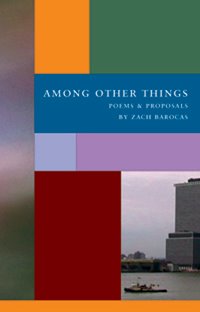
It was only when I began to put together this note that I realized that Zach Barochas’ book, Among Other Things, was not published by Flood Editions, but in fact by his own press, Cultural Society. It has the look and feel of a Flood Editions book, both print wise and design wise, and – most important of all – in terms of the poetry contained therein. Indeed, Peter O’Leary (whose brother Michael co-edits Flood) is one of the collection’s three blurbistes. It’s an interesting – perhaps telling – association for a poet who has made a living, it would seem, as a post-punk drummer for much of the past 15 years, but who lists Hayden Carruth, Denise Levertov & Muriel Rukeyser among his “heroes” on his MySpace page.
But it’s not the design of the book that made read it as tho it were a Flood Edition effort, it’s the values expressed in the poems themselves. Here is a case in point:
On
Pick a color, any
color (remember, black
is not a color; white,
too, is not a color).
Keep your selection in
mind & on the tip of
your tongue; hold it, let it
sit, savor its warmth or
cool. Make it primary
& don’t blend it away.
Know oblivion’s no
place for color. Vivid-
ness is key, clarity
is key, exactitude,
like purity, is key.
Right down to the use of the semi-colon to structure a complex, joined statement & the use of the ampersand to nod to his post-avant heritage, this poem enacts the very values for which it argues. It is, in that sense, almost perfect.
But perfect – in this sense – is not necessarily a superlative. Rather, it’s a desire for precision that reminds me of nothing so much as certain bug fanciers’ preference for pinned specimens under brilliant lighting to the whizzing critters of the garden. The result, as in this piece, is an open poetics striving for a closed – which is to say highly finished – poem. There is a tension in all this that can be – as this is – fascinating, precisely because Barocas’ sense of craft is so high that the strain of the impossible comes through as compressed energy. It’s a dynamic I find in a lot of the poems in this book & my reaction to it is positively visceral – I’m compelled to read the poems but almost want to shout No as they come to their hard-edged conclusions. I can’t think of a poet whose work has set off quite this same reaction in me since William Bronk.
It’s as if Barocas has tapped into this contradictory vein one finds in certain members of the post-avant, notably along the Zukofskyan side of things. On the one hand, here is a poet with considerable skills and a great sense of craft. On the other, the focus of all this feels so constrained as to be maddening. Just as Zukofsky himself bemused & befuddled his admirers with both his willingness to pursue open-ended innovation with great rigor, but proved so anal retentive that each copy of every book his house is said to have been stored separately in its own clear plastic cover, Barocas seems to be heading in two directions at once. In general, in Among Other Things, the person who would think to equate exactitude and purity is the one who wins outs. But in fact, I think the more interesting Barocas is (or would be) the other, the writer who would use this sense of craft to kick out the jams and boogie more.





